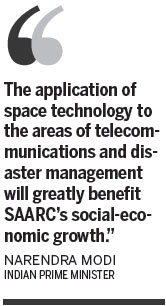S. Asia shoots for space hopes
Regional collaboration in space technology must be enhanced to achieve sustainable development in South Asia, according to South Asian Association for Regional Cooperation leaders.
Addressing the inaugural session of the 18th SAARC summit in the Nepalese capital Katmandu on Wednesday, Indian Prime Minister Narendra Modi said his country is ready to develop a satellite specifically for the region by 2016.
"India will host a conference for all South Asian partners next year to strengthen our abilities to apply space technology to economic development and governance," he added.
Earlier this year, during a speech on the launch of a commercial rocket, Modi had urged space scientists to develop a SAARC satellite and enlarge the footprint of India's satellite-based navigation system to serve the interests of the entire region.
Similarly, Sri Lankan President Mahinda Rajapaksa focused on enhancing "space diplomacy" to strengthen relations among the SAARC countries.

"The application of space technology to the areas of telecommunications and disaster management will greatly benefit SAARC's social-economic growth," he said.
The Sri Lankan president praised India for its progress in the field of space technology and welcomed Modi's proposal to develop a satellite for SAARC.
To date, only two SAARC countries - India and Pakistan - have sent satellites into space, but several others are trying to follow.
Space cooperation will be discussed during the summit with a focus on deeper integration among the eight South Asian neighbors - Afghanistan, Bangladesh, Bhutan, India, the Maldives, Nepal, Pakistan and Sri Lanka.
The leaders are meeting for the first time since the election of a new Indian government and are eager to improve ties.
Some stressed the need for greater cooperation to combat poverty in South Asia, where cross-border trade remains minimal, held back by mistrust and weak infrastructure.
Pakistani Prime Minister Nawaz Sharif said, "My vision for our region is a dispute-free South Asia where, instead of fighting each other, we jointly fight poverty, illiteracy, disease, malnourishment and unemployment."
No proxy war
Afghanistan's new president said he would not let his country become the battleground of a proxy war.
"We will not allow our territory to be used against any of our neighbors. But we will not permit anybody to conduct proxy wars on our soil either," Ashraf Ghani told the gathered leaders.
Xinhua - AFP
(China Daily 11/27/2014 page11)














